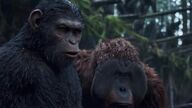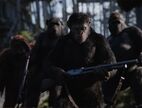"Rise of the Planet of the Apes: The Final Battle" is considered by North American film critics to be the best film of the year, and even one of the best films of this era.
Throughout the history of film, trilogy is common, but the three works have always maintained a high level, and even the final work can surpass the previous work, there are only a handful of them. Classics such as "The Godfather" suffered a sharp decline in the third installment. But the final battle's rating far exceeds the first two. It can be said that the final battle is one of the most ambitious commercial films in recent years.
As the final chapter of the "Rise of the Planet of the Apes" series, "Endgame" continues the story of the previous work. The second "Battle of the Dawn", provoked by Caesar's right-hand man Koba, apes and humans are caught in an inevitable war. But even so, Caesar still harbors a desire to live in peace with mankind. However, when he encounters the ruthless human leader "Colonel", the latter's series of crazy actions completely ignite Caesar's anger. Caesar, who has always advocated peace, could no longer suppress his inner hatred, and he embarked on the road of revenge.
Judging from the outline of the story, "The Ultimate Battle" is mediocre. It just follows most of the popcorn sequel routines: the protagonist meets a new villain, customer service new challenges, and the play ends. "Furious 8", "Silver Guardian 2", "Pirates of the Caribbean 5", might as well be. Ultimate Battle is unique in its narrative mode. The first third is a road piece. On the way to seek revenge, Caesar and his companions met a little Loli Noa (Nova) who lost her ability to speak. In the background of the apocalypse, the protagonist takes the little loli on a long road, and there is a shadow of the blockbuster "Wolverine 3" in March. In the middle, the depiction of the relationship between humans and apes enters the category of racial films, like watching "12 Years a Slave". And the latter part of the film becomes a fugitive movie, reminiscent of The Shawshank Redemption.
Throughout the film, director Matt Reeves tried his best to incorporate many types of elements, of course not dazzling skills. He organically serves the technique to the whole, thereby uncovering the theme that runs through the entire series — the ugliness of human nature and the light of human nature. Among them, the climax confrontation between Caesar and the colonel is the concentrated expression of the confrontation between these two human natures.
The core setting of "Ultimate Battle" is the mutation of the previous drug ALZ-113.
In the first "Rise of the Planet of the Apes", ALZ-113 made the brain of apes evolve, the IQ of apes increased rapidly, and then got rid of human control, but this drug will cause human death. In the second "Battle of the Dawn", most of the human beings were killed by it, and only a small number of humans who were immune to the drug survived. In the third "The Ultimate Battle", the drug mutated again: Humans who were originally immune to ALZ-113 would experience brain degeneration after being infected with the virus, and eventually lost their ability to speak and think.
In other words, people are becoming more and more like - apes. Humans and apes have replaced behavioral abilities.
The question is, is human nature based only on language and thinking?
It's not that simple.
The cruelty of life makes Caesar, who is dedicated to goodness, doubt himself again and again——
Does my insistence make sense? Can humans and apes really coexist peacefully? If his feelings for human beings are only hatred, what is the difference between that and the defeated Koba?
In contrast, the Colonel's attitude was much more determined. Just as he himself established the principle: Sometimes it is necessary to abandon human nature in order to ensure the survival of human beings.
Apes struggle to live like a human, but humans alienate themselves into a beast in order to live.
Not only that, after the ability, the apes' adherence to "humanity" has also been replaced...
It can be said that the "War" of "The Ultimate Battle" is not only a confrontation between orangutans, but also a torture of Caesar's soul.
This kind of battle, in a small way, is character growth. In the trilogy, Caesar's feelings for people range from near to far, and then to neutral. In "Rise of the Planet of the Apes", it relies on human beings to become free; in "Battle of the Dawn", it establishes itself as a leader in the conflict of ideas with similar Koba; in "The Ultimate Battle", personal hatred and peace Willing to think tit for tat, and finally perfect his true beliefs in the war.
In a big way, it is an exquisite allegory of the Romance of Species. It vividly and accurately shows how wisdom can make a species stand out from the competition, but powerful wisdom also brings an equal amount of greed. When this greed expands to the point of losing reverence for life, higher creatures are bound to explode out of control. kill. In the end, natural evolution can only be achieved with the mass death of this species.
Going a step further - what is a human being? Is human nature an individual choice or a collective belief? When a person gives up his fragile humanity, how can he survive in a world where civilization has retreated to the wild? "The Ultimate Battle" leads the audience to think about such issues. These 5% realistic elements have determined that it exceeds the confidence of ordinary blockbusters.
In addition, emotion is the final point of the final chapter. For the gorillas in this film, emotion is the last barrier of evolution.
Think about it - the rise in IQ represents the evolution of the orangutan, but is that all?
No, emotions (including heavy family affection, hatred, or everyday humor) are the fuller evolution.
Throughout the entire series, almost every iconic stage of species evolution is presented: take Caesar as an example.
The first one he possessed was "consciousness". The virus awakened him, but he was still a complex body coexisting with humans and apes.
The second part shows his "intelligence", which is not influenced by emotions, making his wisdom appear particularly tall, even overshadowing the existence of human beings. Consciousness cannot make him king, but reason can. Because consciousness is formed by medicine, even a monkey has it; but reason is honed by Caesar through acquired struggle and experience. He has mastered the logic of thinking to stand out from the crowd.
The third, mixed with the most complex emotions. Although emotion is innate, how to deal with it is a human instinct that needs repeated practice. In addition, emotion often has an anti-logical sensibility. Once it has a huge impact, Caesar will inevitably be as overwhelmed as an ignorant child-because he is just getting started on the road of evolution. The old Caesar in the eyes of the audience is actually like the "young son in the eyes of his father" in reality.
All the clumsiness of a newborn, the slow understanding of problem-solving, is a natural part of growing up. This also answers the smooth and restrained narrative of this film, because it has to pave the way for the growth of Caesar's emotions, and this emotional road cannot be paved too hastily.
So, the ending of this movie, in my eyes, has two endings in parallel.
One is the dominant ending: Caesar leads the apes to find a happy land, dies satisfactorily, and has a happy ending.
One is the implicit ending: Caesar finally completed the evolution trilogy, starting from a child, completing the three major topics of consciousness, reason, and emotion, and finally comprehend the meaning of reproduction, survival and even death.
&
View more about War for the Planet of the Apes reviews











